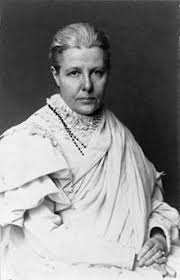- Annie Besant (1847–1933) was a British socialist, theosophist, educationist, and women’s rights activist. She moved to India in the late 19th century and became deeply involved in Indian politics and the nationalist movement.
- As a proponent of self-rule (Swaraj) for India, she played a significant role in mobilizing public opinion against British colonial rule.
- In 1916, Annie Besant founded the Home Rule League, which campaigned for self-governance for India within the British Empire. This movement inspired widespread nationalist sentiment across the country.
- Besant worked alongside prominent Indian leaders such as Bal Gangadhar Tilak, playing a crucial role in bridging gaps between different factions of the nationalist movement.
- Her efforts earned her immense respect among Indian leaders and the public, leading to her election as the President of the Indian National Congress (INC).
- Annie Besant was elected as the President of the Indian National Congress at the 1917 Calcutta session.
- She became the first woman to hold this position, marking a significant milestone for both the INC and the Indian nationalist movement.
- Her presidency underscored the inclusivity of the INC and its openness to contributions from diverse leaders, including non-Indians.
- Besant’s election symbolized the growing momentum of the nationalist movement and highlighted the role of international supporters in India’s struggle for freedom.
- She used her platform to advocate for constitutional reforms, greater Indian representation in governance, and the rights of women.
- Her leadership helped strengthen the Home Rule Movement and inspired many Indians to join the nationalist cause.
- Annie Besant’s tenure as INC President was brief but impactful. Her contributions to Indian politics and her advocacy for Swaraj left a lasting legacy.
- While she was the first woman to lead the INC, leaders like Razia Sultana and later Sarojini Naidu (1925) continued to break barriers as influential women leaders in India.
- Annie Besant was the first woman to preside over the Indian National Congress, elected as President in 1917 during the Calcutta session.
- A British-born activist, her leadership highlighted the inclusivity of the nationalist movement and emphasized India’s demand for self-rule.
- Her contributions to Indian nationalism and the Home Rule Movement were pivotal in inspiring mass participation in the freedom struggle.







